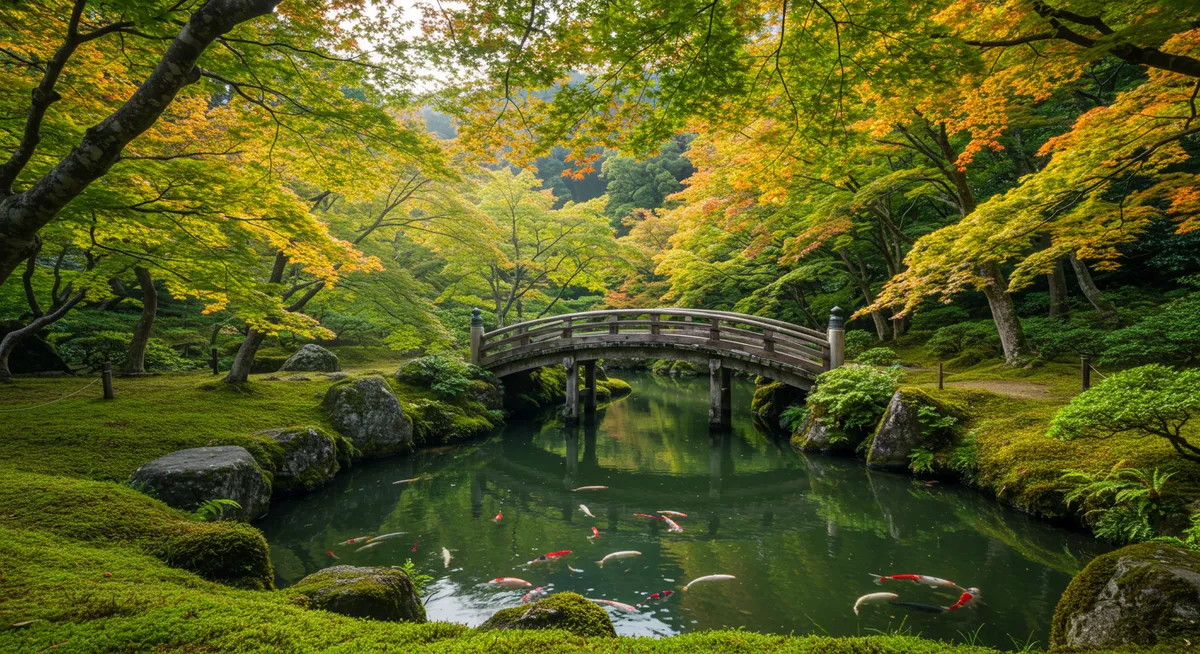
Kyoto Gardens for Nature Lovers: Top Picks
Table of Contents
Want to find the best nature experiences for this destination? Chat with our nature tourism specialist!
Get Nature TipsCategory: kyoto-gardens-for-nature-lovers
Discovering Kyoto's Serene Gardens for Nature Enthusiasts
As a seasoned traveler who has explored Japan extensively, I've always found Kyoto's natural beauty truly captivating. There's a profound sense of tranquility found within its meticulously crafted green spaces, offering a perfect antidote to urban bustle. For anyone passionate about flora, serene landscapes, and authentic Japanese aesthetics, exploring Kyoto gardens for nature lovers is an absolute must-do. These verdant havens provide a unique glimpse into Japan's deep respect for nature, transforming each visit into a meditative experience. My personal journey through these spaces has consistently revealed new layers of beauty and peaceful contemplation, making them standout attractions in a city already rich with cultural wonders. For more comprehensive travel insights, visit TouristNature.com.Gardens for Tranquil Reflection
When seeking profound peace, certain Kyoto gardens for nature lovers stand out for their meditative qualities. Ryoan-ji, with its iconic rock garden, invites quiet contemplation, allowing visitors to ponder the mysteries of Zen. Similarly, the sub-temples within Daitoku-ji complex offer incredibly serene moss gardens and meticulously raked gravel, embodying the essence of Japanese landscape design. I vividly remember the quiet hush here, broken only by the rustling leaves—a truly immersive experience. These spaces are masterpieces of natural tranquility, where the deliberate placement of every stone and plant encourages introspection. For more general insights into the city's natural allure, consider exploring various Kyoto nature attractions that complement these garden visits beautifully.
Zen and Traditional Japanese Landscapes
The philosophy of Zen profoundly influences many Kyoto gardens, shaping them into living artworks. Tenryu-ji Garden, a UNESCO World Heritage site, is a prime example, seamlessly blending natural elements with traditional design, offering picturesque views that change with the seasons. Its large pond and borrowed scenery from Arashiyama’s mountains provide a stunning backdrop for any nature enthusiast. My experience here during autumn was breathtaking, with vibrant maples reflecting in the water. These meticulously designed landscapes aren't just pretty; they tell stories of harmony and balance, making the study of `Japanese gardens` a captivating endeavor. For those venturing near, the iconic Arashiyama Bamboo Grove also offers a unique natural spectacle just a stone's throw away.
Nature's Palette: Seasonal Blooms & Foliage
Kyoto gardens are not just about evergreen tranquility; they are also vibrant canvases celebrating the changing seasons. For nature lovers, gardens like Eikando Zenrin-ji are famous for their spectacular autumn foliage, drawing visitors from around the world to witness the fiery reds and golds. Similarly, during spring, places such as Shosei-en (Kikoku-tei Garden) burst into life with various flowering plants, including stunning irises and plum blossoms. Having seen Kyoto transform from vibrant spring to fiery autumn, I can attest to the sheer beauty of these seasonal transformations, making repeat visits immensely rewarding. Understanding the best times for these displays is crucial for planning, especially for specific Kyoto cherry blossom nature spots.
Beyond the Famous: Hidden Green Gems
While the grand, iconic sites draw crowds, some of the most rewarding Kyoto gardens for nature lovers are the lesser-known, secluded havens. Places like the Shugakuin Imperial Villa, though requiring advance booking, offer expansive landscapes, ponds, and tea houses that are meticulously maintained and rarely overcrowded. Another gem is the tranquil Adashino Nembutsu-ji, a poignant temple garden with countless stone statues nestled among the moss. These hidden green spaces provide a more intimate connection with Kyoto's natural artistry. For adventurers who love greenery, exploring best hiking trails in Kyoto can also lead to breathtaking panoramic views of the city's verdant surroundings.
Frequently Asked Questions
When is the best time to visit Kyoto gardens?
Are there entry fees for most Kyoto gardens?
What makes Kyoto gardens unique for nature lovers?
Kyoto’s gardens offer more than just aesthetic pleasure; they are profound expressions of nature's artistry and human devotion. For any true nature lover, exploring these diverse havens, from contemplative Zen landscapes to vibrant seasonal displays, provides an unparalleled journey into tranquility and beauty. Each garden tells its own story through its carefully curated plants, stones, and water features, inviting deep reflection. We encourage you to immerse yourself in the natural wonders of Kyoto's garden landscapes and discover your own serene sanctuary within this historic city.